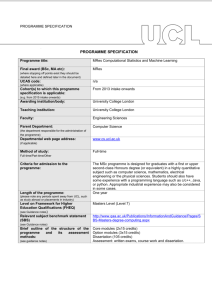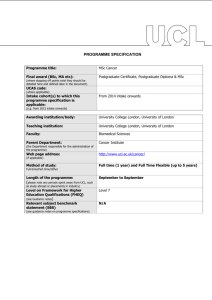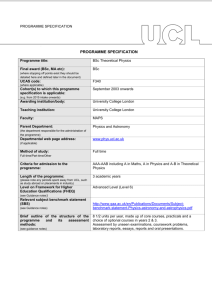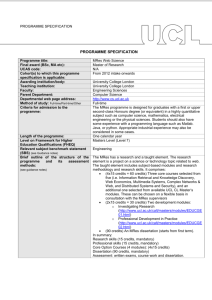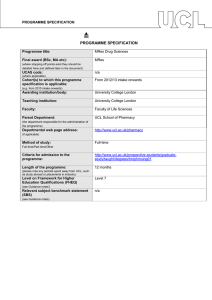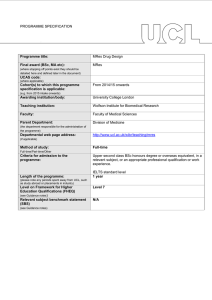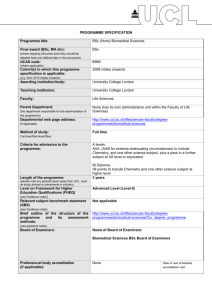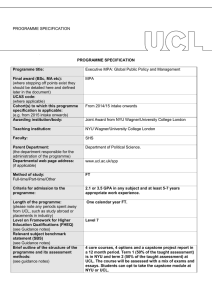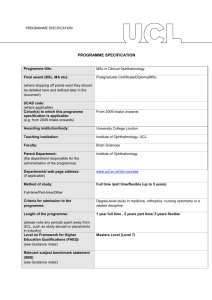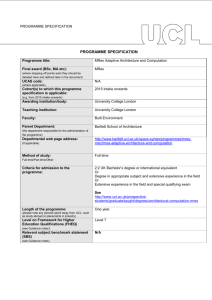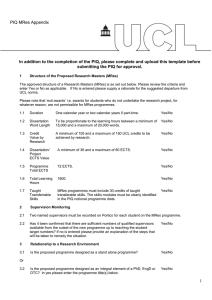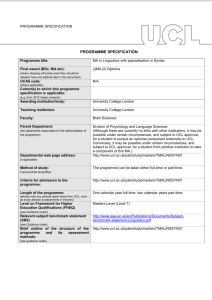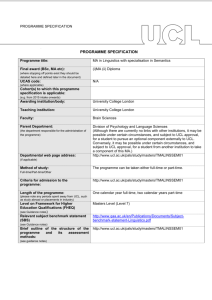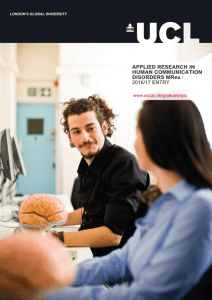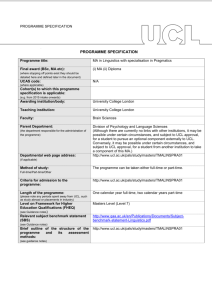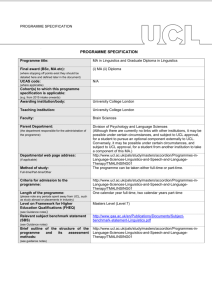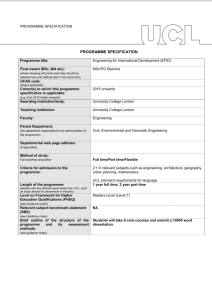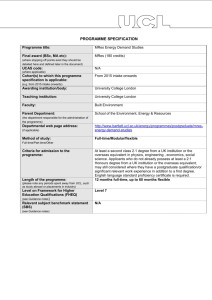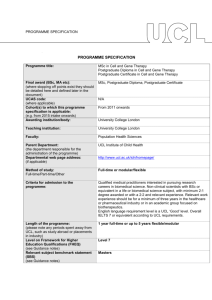MRes Vision Research - University College London
advertisement
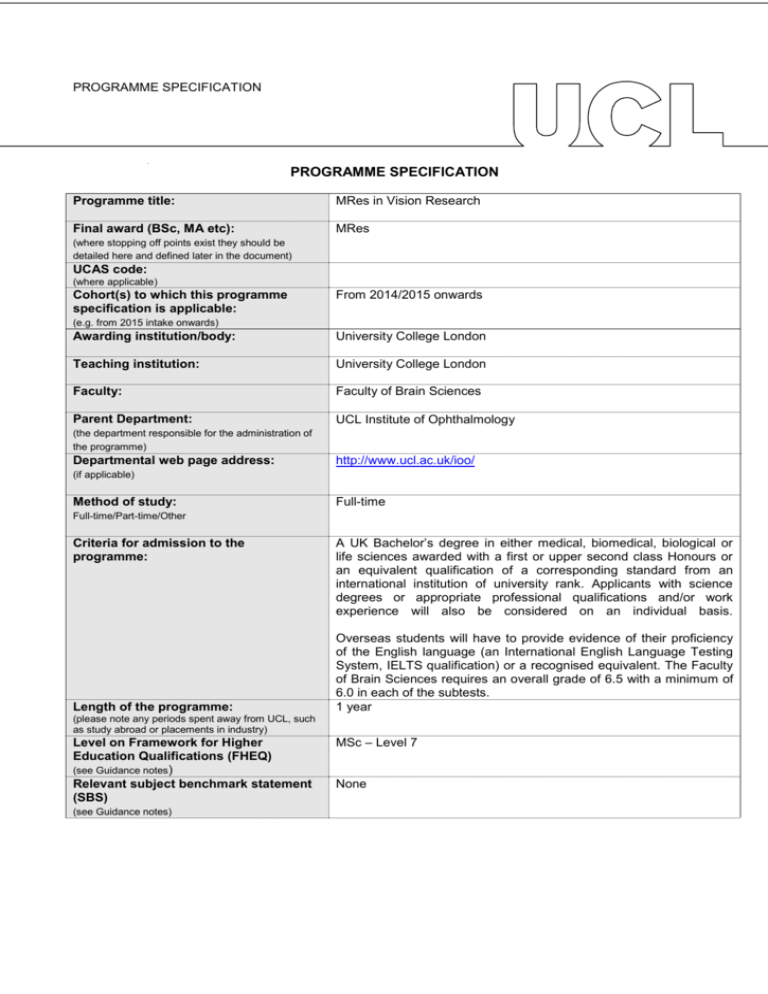
PROGRAMME SPECIFICATION PROGRAMME SPECIFICATION Programme title: MRes in Vision Research Final award (BSc, MA etc): MRes (where stopping off points exist they should be detailed here and defined later in the document) UCAS code: (where applicable) Cohort(s) to which this programme specification is applicable: From 2014/2015 onwards (e.g. from 2015 intake onwards) Awarding institution/body: University College London Teaching institution: University College London Faculty: Faculty of Brain Sciences Parent Department: UCL Institute of Ophthalmology (the department responsible for the administration of the programme) Departmental web page address: http://www.ucl.ac.uk/ioo/ (if applicable) Method of study: Full-time Full-time/Part-time/Other Criteria for admission to the programme: Length of the programme: A UK Bachelor’s degree in either medical, biomedical, biological or life sciences awarded with a first or upper second class Honours or an equivalent qualification of a corresponding standard from an international institution of university rank. Applicants with science degrees or appropriate professional qualifications and/or work experience will also be considered on an individual basis. Overseas students will have to provide evidence of their proficiency of the English language (an International English Language Testing System, IELTS qualification) or a recognised equivalent. The Faculty of Brain Sciences requires an overall grade of 6.5 with a minimum of 6.0 in each of the subtests. 1 year (please note any periods spent away from UCL, such as study abroad or placements in industry) Level on Framework for Higher Education Qualifications (FHEQ) (see Guidance notes) Relevant subject benchmark statement (SBS) (see Guidance notes) MSc – Level 7 None Brief outline of the structure of the programme and its assessment methods: (see guidance notes) Board of Examiners: Professional body accreditation (if applicable): The MRes in Vision Research is a programme of study worth 180 UCL credit points. Two taught modules, worth 15 credits each, will focus on key transferrable personal and professional skills centred on research excellence. The first of these modules, Research in Practice, will teach generic transferrable research skills related to research statistics, the regulatory and ethical aspects of research, research governance, and the critical appraisal and interpretation of research. The assessment of this module will be an unseen written examination. The second of these modules, Developing Research, will deal with the practical aspects of developing and communicating research in the context of professional career progression in research and academia. The module will include aspects of practical written and oral communication, career pathways, research enterprise and entrepreneurship. This module is designed to align with the Research Project, and the assessment will include a written task (abstract) and an oral task (project presentation) based on the Research Project. The programme will include two core teaching modules worth 15 credits each. Students will be able to choose any two modules from the existing MSc Biology of Vision. The objective is to provide students with the core theoretical knowledge required to understand the biology of the visual system. The Research Project (120 credits) is the major component of the MRes in Vision Research. Supervision of the project will be undertaken by a primary supervisor based at the Institute of Ophthalmology and a secondary supervisor based at the Institute or within the Faculty of Brain Sciences. Assessment of the Research Project will be a research dissertation of the required word length and an oral presentation. Name of Board of Examiners: The MRes in Vision Research will share the MSc Biology of Vision Board of Examiners. None Date of next scheduled accreditation visit: PROGRAMME OUTCOMES: The programme provides opportunities for students to develop and demonstrate knowledge and understanding, qualities, skills and other attributes in the following areas: A: Knowledge and understanding Knowledge and understanding of: The fundamental biology, physiology and function of the ocular system. Teaching/learning methods and strategies: Lectures, tutorials, practicals, journal clubs, workshops, problem-based tasks. Statistical research methods. Ethical and regulatory aspects of research. Research governance. Research communication. Career pathways in research. Enterprise and entrepreneurship in research. Assessment: Unseen written examination, essays, oral presentations. B: Skills and other attributes Intellectual (thinking) skills: Critically appraise and interpret research. Evaluate advanced research methodologies as they apply to an independent empirical research project. Teaching/learning methods and strategies: Lectures, tutorials, practicals, journal clubs, workshops, problem-based tasks, independent empirical research project. Evaluate current research and advanced scholarship in ocular science. Develop and propose an experimental hypothesis, design experiments and interpret findings with critical insight and appropriate depth of understanding. Manage the planning and delivery of a project. Assessment: unseen written examination, essays, oral presentations, practicals, research dissertation. C: Skills and other attributes Practical skills (able to): Communicate research effectively through written and oral means. Use a range of software packages to effectively and professionally communicate science through verbal, written and visual means. Teaching/learning methods and strategies: Supervised practical experimentation; computational methods in statistics; computational literacy in tools used for accessing information resources; computational literacy in programmes used for the interpretation, preparation and presentation of research data. Design and implement an experimental plan for a research project. Conduct laboratory-based experiments. Access and utilize appropriate resources in order to effectively find and manage information and reference material. Manage and analyse data, including statistical data, and prepare data for publication. Assessment: Essays, oral presentations, figure and poster design, primary data presentation, research project abstract and protocol, research dissertation D: Skills and other attributes Transferable skills (able to): Engage and communicate effectively with others to disseminate knowledge. Teaching/learning methods and strategies: Lectures, seminars, independent study, journal clubs, practical demonstrations, workshops, computational work, supervised empirical research project. Demonstrate self-direction, originality and the capacity for critical independent thought in planning and implementing task. Demonstrate independent problem solving capability. Manage projects independently. Collaborate effectively with team members to further research goals. Assessment: Unseen written examinations, essays, oral presentations, problem-based tasks, research dissertation. The following reference points were used in designing the programme: the Framework for Higher Education Qualifications: (http://www.qaa.ac.uk/en/Publications/Documents/Framework-Higher-Education-Qualifications-08.pdf); the relevant Subject Benchmark Statements: (http://www.qaa.ac.uk/assuring-standards-and-quality/the-quality-code/subject-benchmark-statements); the programme specifications for UCL degree programmes in relevant subjects (where applicable); UCL teaching and learning policies; staff research. Please note: This specification provides a concise summary of the main features of the programme and the learning outcomes that a typical student might reasonably be expected to achieve and demonstrate if he/she takes full advantage of the learning opportunities that are provided. More detailed information on the learning outcomes, content and teaching, learning and assessment methods of each course unit/module can be found in the departmental course handbook. The accuracy of the information contained in this document is reviewed annually by UCL and may be checked by the Quality Assurance Agency. Programme Organiser(s) Dr Jacqueline van der Spuy Name(s): Professor Alison Hardcastle Date of Production: 21/10/2013 Date of Review: October 2014 Date approved by Head of Department: October 2014 Date approved by Chair of Departmental Teaching Committee: Date approved by Faculty Teaching Committee October 2014 November 2014
